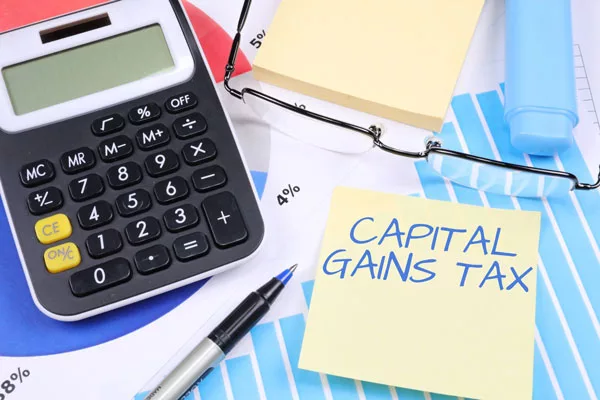Understanding Capital Gains Tax: A Guide to Tax-Efficient Investing
Table of Contents
Introduction
Understanding Capital Gains Tax” might sound like the title of the world’s most boring book, but stick with me. This topic is crucial, especially if you’re nearing or in retirement.
Think of it as the unsung hero of the financial world, lurking in the background but playing a pivotal role in how much of your hard-earned money you get to keep.
And while we’re on the topic of keeping things, where does that one sock always disappear to after doing laundry?
But I digress. Let’s dive into the world of capital gains tax and how it impacts your investments
Capital Gains Tax Demystified
Capital gains tax, in its simplest form, is the tax you pay on the profit from selling something that’s increased in value.
Think of it as the government’s way of saying, “Hey, good job on that smart investment! Now, share a little, will you?”
There are two main types: short-term and long-term. The former applies to assets held for less than a year and is usually taxed at a higher rate, while the latter is for assets held for more than a year and enjoys a more favorable tax rate.
Tax-Efficient Investing: The Buffet Analogy
Now, if you’re a high earner, understanding the implications of capital gains tax is crucial. It’s like knowing where the speed cameras are on a highway.
You can drive fast, but you need to know where to slow down. Tax-efficient investing is your roadmap to minimizing the tax burdens on your investments. It’s not about evading taxes but making smart choices that align with tax laws.
So, what exactly is tax-efficient investing? Imagine you’re at a buffet. You’ve got a plate, and you want to fill it up with the most delicious food without overpaying.
Tax-efficient investing is about filling your investment plate in a way that you get the most returns for the least tax cost. It’s about being savvy and understanding which investments offer the best tax advantages.
Best Tax-Advantaged Investments
Speaking of advantages, let’s dive into some of the best tax-advantaged investments out there.
Municipal bonds, for instance, are a favorite among many retirees. The interest from these bonds is usually exempt from federal taxes and, in some cases, state taxes.
But like all investments, they come with their own set of pros and cons. While they offer tax benefits, they might not provide as high returns as other taxable investments.
Taxable Accounts and Their Nuances
Now, let’s talk about taxable accounts. These are your regular brokerage accounts where any income or capital gains are subject to taxes in the year they’re received.
The trick here is to choose the best investments for these accounts. Think long-term holdings that generate capital gains, which are taxed at a lower rate than ordinary income.
Tax-Efficient ETFs and Mutual Funds
For those who love diving deep into the investment pool, tax-efficient ETFs (Exchange Traded Funds) and mutual funds are worth exploring.
These funds are designed to minimize taxable distributions by reducing the amount of buying and selling within the fund.
It’s like having a super-efficient engine that uses less fuel but still gives you a smooth ride.
Conclusion
To wrap things up, maintaining a tax-efficient portfolio is not a one-time task. It’s an ongoing process.
Regular reviews, staying updated with changing tax laws, and consulting with financial professionals can ensure your investments are as tax-efficient as possible.
In conclusion, understanding capital gains tax and the nuances of tax-efficient investing can make a significant difference in your retirement finances. It’s like having a secret recipe that makes everything taste better.
And while we’re on the topic of secrets, have you ever considered sharing your wisdom through blogging?
Word on the street is that it’s the new gold rush of 2023. And with a sprinkle of AI magic, who knows where it might lead?
Frequently Asked Questions
What exactly is Capital Gains Tax?
Capital Gains Tax (CGT) is a tax on the profit you make when you sell or dispose of an asset that has increased in value. It’s the gain you make that’s taxed, not the amount of money you receive.
How is tax-efficient investing related to Capital Gains Tax?
Tax-efficient investing involves strategies to help reduce the impact of taxes on your investment returns.
By understanding and planning for capital gains tax, you can make decisions that might lower your tax liability.
Are all capital gains subject to this tax?
No, not all capital gains are taxable, and you can legally reduce or even eliminate capital gains tax in some situations, depending on factors like the type of asset, how long you’ve held it, and specific tax laws in your country.
What are tax-efficient ETFs and mutual funds?
Tax-efficient ETFs (Exchange Traded Funds) and mutual funds are designed to minimize tax liabilities.
They do this by limiting the amount of buying and selling within the fund or by strategically selling certain assets at a loss to offset gains.
How can I determine the best investments for my taxable accounts?
It’s essential to consider the tax implications of any investment.
Generally, tax-efficient investments like index funds, ETFs, and tax-managed funds can be suitable for taxable accounts.
However, always consult with a financial advisor to determine the best fit for your specific situation.
Are there ways to offset my capital gains?
Yes, one common method is to sell investments that have lost value to offset the taxable gain.
This is known as tax-loss harvesting. Another option is to hold onto investments for over a year (in many jurisdictions) to qualify for a lower long-term capital gains tax rate.
What are the safest tax-free investments?
Some of the safest tax-free investments include municipal bonds or “munis.”
The interest from these bonds is typically exempt from federal income tax.
However, the safety and tax implications can vary, so it’s essential to do thorough research or consult with a financial professional.
How often do tax laws and regulations change?
Tax laws and regulations can change annually, depending on legislative actions.
It’s crucial to stay updated or work with a tax professional to ensure you’re compliant and taking advantage of any new tax benefits.
Can I avoid capital gains tax if I reinvest the profits?
In some cases, reinvesting profits can defer capital gains tax, but it doesn’t typically eliminate the tax obligation.
Specific rules and exceptions apply, so it’s best to consult with a tax professional about your particular situation.
Remember, while these answers provide a general overview, always consult with a tax or financial professional about your unique circumstances.




